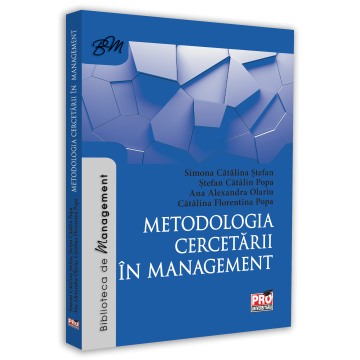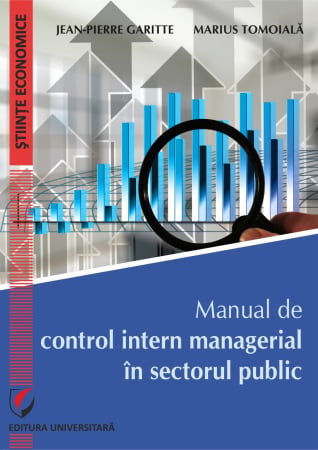Manuscript proposals: [email protected] / 0745 204 115 //// Tracking orders Individuals / Sales: 0745 200 357 / Orders Legal entities: 0721 722 783
ISBN: 978-606-28-0415-2
DOI: 10.5682/9786062804152
Publisher year: 2016
Pages: 164
Publisher: Editura Universitară
Author: Mihaela-Mirela Dogaru
Product Code:
9786062804152
Do you need help?
0745 200 357
- Description
- Download (1)
- Authors
- Content
- More details
- Reviews (0)
The general concept of quality - is used nowadays in all fields, but especially in economic fields, among which is the production of goods and / or services.
The meanings of this word (concept) are philosophical, technical, economic, but also social in nature, because quality in the broadest sense expresses the essential properties of an object, which makes it stand out from all other similar products, which they have the same destination, respectively unity.
Therefore, the success of a business is given by the way the customer perceives the quality of the product or service for which he pays a certain amount of money. As quality is closely linked to the notion of quantity, it must be conceived by sustained activity that is permanently directed to the final consumer of products and / or services, by knowing his needs, to satisfy in the best conditions the customer's expectations or even exceed them with a better quality of products / services.
The quality of the products / services is conferred by the optimal synthesis of the main properties that express the degree of utility in satisfying the expressed needs.
From a technical point of view, the quality expresses the degree of conformity with clear specifications provided in the product documentation. And from an economic point of view, quality expresses the ratio between production costs and customer. In the social sense, quality is represented by the degree of consumer satisfaction.
The International Organization for Standardization defines quality as such - quality is the set of characteristics of an entity that gives it the ability to meet the needs expressed or implied (ISO 8402/1995). According to ISO 9000/2000 quality is the ability of a set of intrinsic characteristics to meet consumer requirements.
That is why quality means continuous improvement, this aspect involves everyone, both the work group and the employers and requires a relatively small expense in order to meet customer requirements. That is why most management practices that emphasize quality such as total quality control or quality control throughout the organization, quality circles and work climate.
Quality management is a quality-focused system, based on the participation of its members, which aims at the long-term success of the organization, by satisfying the customer in the best conditions and obtaining advantages for all members of the organization. The basic principles of quality management are - customer focus; continuous quality improvement; defect prevention; universal responsibility for quality.
Product compliance information
The meanings of this word (concept) are philosophical, technical, economic, but also social in nature, because quality in the broadest sense expresses the essential properties of an object, which makes it stand out from all other similar products, which they have the same destination, respectively unity.
Therefore, the success of a business is given by the way the customer perceives the quality of the product or service for which he pays a certain amount of money. As quality is closely linked to the notion of quantity, it must be conceived by sustained activity that is permanently directed to the final consumer of products and / or services, by knowing his needs, to satisfy in the best conditions the customer's expectations or even exceed them with a better quality of products / services.
The quality of the products / services is conferred by the optimal synthesis of the main properties that express the degree of utility in satisfying the expressed needs.
From a technical point of view, the quality expresses the degree of conformity with clear specifications provided in the product documentation. And from an economic point of view, quality expresses the ratio between production costs and customer. In the social sense, quality is represented by the degree of consumer satisfaction.
The International Organization for Standardization defines quality as such - quality is the set of characteristics of an entity that gives it the ability to meet the needs expressed or implied (ISO 8402/1995). According to ISO 9000/2000 quality is the ability of a set of intrinsic characteristics to meet consumer requirements.
That is why quality means continuous improvement, this aspect involves everyone, both the work group and the employers and requires a relatively small expense in order to meet customer requirements. That is why most management practices that emphasize quality such as total quality control or quality control throughout the organization, quality circles and work climate.
Quality management is a quality-focused system, based on the participation of its members, which aims at the long-term success of the organization, by satisfying the customer in the best conditions and obtaining advantages for all members of the organization. The basic principles of quality management are - customer focus; continuous quality improvement; defect prevention; universal responsibility for quality.
-
Managementul calitatii
Download
MIHAELA-MIRELA DOGARU
Assist. univ. PhD, Dimitrie Cantemir Christian University
Assist. univ. PhD, Dimitrie Cantemir Christian University
CHAPTER 1 - THE EVOLUTION OF THE QUALITY CONCEPT / 9
1.1. AWARENESS OF THE IMPORTANCE AND ROLE OF QUALITY IN THE WORLD / 15
1.2. HISTORICAL EVOLUTION OF TOTAL QUALITY MANAGEMENT / 26
1.3. PRINCIPLES AND CONCEPTS OF TQM / 31
CHAPTER 2 - REPRESENTATIVE THEORIES OF QUALITY MANAGEMENT / 40
2.1. ECONOMIC CONTROL OF THE QUALITY OF MANUFACTURED PRODUCTS / 40
2.2. DEMING'S PROGRAM ON QUALITY IMPROVEMENT / 41
2.3. CONTRIBUTION OF J.M. JURAN IN THE FIELD OF QUALITY MANAGEMENT / 46
2.4. PHILIP CROSBY'S CONTRIBUTION ON THEORY - ZERO DEFECTS / 56
2.5. ARMAND VALLIN FEIGENBAUM - THE FATHER OF THE "TOTAL QUALITY CONTROL" CONCEPT / 57
2.6. KAORU ISHIKAWA - DIAGRAM CAUZA EFECT / 59
CHAPTER 3 - LEADERSHIP / 80
3.1. THE ROLE OF LEADERSHIP IN QUALITY MANAGEMENT / 80
3.2. SR ISO 8402: 1995/86
CHAPTER 4 - QUALITY COSTS / 90
4.1. STRUCTURE OF QUALITY COSTS / 93
4.2. ADVANTAGES OF USING THE QUALITY STRATEGY / 97
CHAPTER 5 - STANDARDIZATION / 100
5.1. INITIAL SITUATION AND PROBLEMS IN THE FIELD OF QUALITY / 101
5.2. FRAMEWORK FOR QUALITY MEASUREMENT SYSTEMS FOR BUSINESS PROCESSES / 105
5.2.1. INTEGRATED MANAGEMENT SYSTEM MANUAL / 107
5.2.2. COMMITMENT AND POLICY IN THE FIELD OF SMI / 108
5.2.3. THE GOAL. SCOPE / 110
5.2.3.1. PURPOSE MSMI / 110
5.3.2.2. SCOPE / 110
5.2.3.2. COMPANY PRESENTATION / 110
5.2.4. DEFINITIONS AND ABBREVIATIONS / 113
5.2.4.1. DEFINITIONS / 113
5.2.4.2. ABBREVIATIONS / 118
5.3. INTEGRATED MANAGEMENT SYSTEM / 119
5.3.1. GENERAL REQUIREMENTS / 119
5.3.2. DOCUMENTATION REQUIREMENTS / 119
5.3.2.1. GENERALITIES / 119
5.3.2.2. QUALITY-ENVIRONMENT-ENVIRONMENTAL MANAGEMENT SYSTEM MANUAL / OHSAS / 120
5.3.3. DOCUMENT CONTROL / 121
5.4.4. CONTROL OF RECORDS / 122
5.4. MANAGEMENT RESPONSIBILITY / 123
5.4.1. MANAGEMENT COMMITMENT / 123
5.4.1.1. ENVIRONMENTAL ASPECTS / 123
5.5.1.2. OCCUPATIONAL RISKS / 123
5.5.1.3. LEGAL REQUIREMENTS AND OTHER REQUIREMENTS / 123
5.5.1.4. OBJECTIVES, TARGETS AND PROGRAMS / 124
5.5.1.5. HAZARD IDENTIFICATION, RISK ASSESSMENT AND CONTROL / 125
5.5.1.6. QUALITY, ENVIRONMENTAL MANAGEMENT SYSTEM PLANNING, OHSAS / 125
5.4.2. CUSTOMER ORIENTATION / 126
5.4.3. SMI POLICY / 126
5.4.4. RESPONSIBILITY, AUTHORITY AND COMMUNICATION / 126
5.4.4.1. RESPONSIBILITY AND AUTHORITY / 126
5.4.4.2. MANAGEMENT REPRESENTATIVE / 127
5.4.4.3. INTERNAL AND EXTERNAL COMMUNICATION / 127
5.4.5. MANAGEMENT ANALYSIS / 128
5.4.5.1. GENERALITIES / 128
5.4.5.2. INPUTS OF THE ANALYSIS / 129
5.4.5.3 OUTPUT ELEMENTS OF THE ANALYSIS / 129
5.5. RESOURCE MANAGEMENT / 130
5.5.1. RESOURCE ASSURANCE / 130
5.5.2. HUMAN RESOURCES / 130
5.5.2.1. GENERALITIES / 130
5.5.2.2. COMPETENCE, AWARENESS, TRAINING / 130
5.5.3. INFRASTRUCTURE / 131
5.5.4. WORKING ENVIRONMENT / 132
5.6. PRODUCT / SERVICE IMPLEMENTATION PLANNING / 132
5.6.2. PROCESSES REGARDING THE CUSTOMER RELATIONSHIP / 133
5.6.2.1. DETERMINATION OF REQUIREMENTS REGARDING THE ACTIVITIES TO BE CARRIED OUT / 133
5.6.2.2. ANALYSIS OF REQUIREMENTS REGARDING THE ACTIVITIES CARRIED OUT / 134
5.6.2.3. CUSTOMER COMMUNICATION / EXTERNAL COMMUNICATION / 134
5.6.3. DESIGN AND DEVELOPMENT / 134
5.6.3.2. ENTRY ELEMENTS OF DESIGN AND DEVELOPMENT / 135
5.6.3.3. OUTPUT ELEMENTS OF DESIGN AND DEVELOPMENT / 135
5.6.3.4. DESIGN AND DEVELOPMENT ANALYSIS / 135
5.6.3.5. DESIGN AND DEVELOPMENT VERIFICATION / 136
5.6.3.6. VALIDATION OF DESIGN AND DEVELOPMENT / 136
5.6.3.7. CONTROL OF CHANGES IN DESIGN AND DEVELOPMENT / 136
5.6.4. SUPPLY / 136
5.6.4.1. PROCUREMENT PROCESS / 136
5.6.4.2. SUPPLY INFORMATION / 137
5.6.4.3. VERIFICATION OF THE SUPPLIED PRODUCT / 137
5.6.5. PRODUCTION AND SUPPLY OF SERVICES / 138
5.6.5.1. CONTROL OF PRODUCTION AND SUPPLY OF SERVICES / 138
5.6.5.2. PROCESS VALIDATION / 138
5.6.5.3. IDENTIFICATION AND TRACEABILITY / 139
5.6.5.4. CUSTOMER PROPERTY / 139
5.6.5.5. PRODUCT PRESERVATION / 139
5.6.6. CONTROL OF MEASUREMENT AND MONITORING EQUIPMENT / 140
5.6.7. OPERATIONAL CONTROL / 141
5.6.8. EMERGENCY PREPARATION AND RESPONSE CAPACITY / 142
5.7. MEASUREMENT, ANALYSIS AND IMPROVEMENT / 143
5.7.1. GENERALITIES / 143
5.7.2. MONITORING AND MEASUREMENT / 143
5.7.2.1. CUSTOMER SATISFACTION / 143
5.7.2.2. INTERNAL AUDIT / 144
5.7.2.3. PROCESS MEASUREMENT AND MONITORING / 145
5.7.2.4. Product Monitoring And Measurement / 146
5.7.2.5. MONITORING OF ENVIRONMENTAL ASPECTS / 147
5.7.2.6. MONITORING AND MEASUREMENT OF PERFORMANCE SSM / 147
5.7.2.7. CONFORMITY ASSESSMENT / 147
5.7.3. NON - COMPLIANCE PRODUCT CONTROL / 148
5.7.4. DATA ANALYSIS / 149
5.7.5.1. CONTINUOUS IMPROVEMENT / 149
5.7.5.2. CORRECTIVE ACTIONS / 150
5.7.5.3. PREVENTIVE ACTIONS / 150
BIBLIOGRAPHY / 153
1.1. AWARENESS OF THE IMPORTANCE AND ROLE OF QUALITY IN THE WORLD / 15
1.2. HISTORICAL EVOLUTION OF TOTAL QUALITY MANAGEMENT / 26
1.3. PRINCIPLES AND CONCEPTS OF TQM / 31
CHAPTER 2 - REPRESENTATIVE THEORIES OF QUALITY MANAGEMENT / 40
2.1. ECONOMIC CONTROL OF THE QUALITY OF MANUFACTURED PRODUCTS / 40
2.2. DEMING'S PROGRAM ON QUALITY IMPROVEMENT / 41
2.3. CONTRIBUTION OF J.M. JURAN IN THE FIELD OF QUALITY MANAGEMENT / 46
2.4. PHILIP CROSBY'S CONTRIBUTION ON THEORY - ZERO DEFECTS / 56
2.5. ARMAND VALLIN FEIGENBAUM - THE FATHER OF THE "TOTAL QUALITY CONTROL" CONCEPT / 57
2.6. KAORU ISHIKAWA - DIAGRAM CAUZA EFECT / 59
CHAPTER 3 - LEADERSHIP / 80
3.1. THE ROLE OF LEADERSHIP IN QUALITY MANAGEMENT / 80
3.2. SR ISO 8402: 1995/86
CHAPTER 4 - QUALITY COSTS / 90
4.1. STRUCTURE OF QUALITY COSTS / 93
4.2. ADVANTAGES OF USING THE QUALITY STRATEGY / 97
CHAPTER 5 - STANDARDIZATION / 100
5.1. INITIAL SITUATION AND PROBLEMS IN THE FIELD OF QUALITY / 101
5.2. FRAMEWORK FOR QUALITY MEASUREMENT SYSTEMS FOR BUSINESS PROCESSES / 105
5.2.1. INTEGRATED MANAGEMENT SYSTEM MANUAL / 107
5.2.2. COMMITMENT AND POLICY IN THE FIELD OF SMI / 108
5.2.3. THE GOAL. SCOPE / 110
5.2.3.1. PURPOSE MSMI / 110
5.3.2.2. SCOPE / 110
5.2.3.2. COMPANY PRESENTATION / 110
5.2.4. DEFINITIONS AND ABBREVIATIONS / 113
5.2.4.1. DEFINITIONS / 113
5.2.4.2. ABBREVIATIONS / 118
5.3. INTEGRATED MANAGEMENT SYSTEM / 119
5.3.1. GENERAL REQUIREMENTS / 119
5.3.2. DOCUMENTATION REQUIREMENTS / 119
5.3.2.1. GENERALITIES / 119
5.3.2.2. QUALITY-ENVIRONMENT-ENVIRONMENTAL MANAGEMENT SYSTEM MANUAL / OHSAS / 120
5.3.3. DOCUMENT CONTROL / 121
5.4.4. CONTROL OF RECORDS / 122
5.4. MANAGEMENT RESPONSIBILITY / 123
5.4.1. MANAGEMENT COMMITMENT / 123
5.4.1.1. ENVIRONMENTAL ASPECTS / 123
5.5.1.2. OCCUPATIONAL RISKS / 123
5.5.1.3. LEGAL REQUIREMENTS AND OTHER REQUIREMENTS / 123
5.5.1.4. OBJECTIVES, TARGETS AND PROGRAMS / 124
5.5.1.5. HAZARD IDENTIFICATION, RISK ASSESSMENT AND CONTROL / 125
5.5.1.6. QUALITY, ENVIRONMENTAL MANAGEMENT SYSTEM PLANNING, OHSAS / 125
5.4.2. CUSTOMER ORIENTATION / 126
5.4.3. SMI POLICY / 126
5.4.4. RESPONSIBILITY, AUTHORITY AND COMMUNICATION / 126
5.4.4.1. RESPONSIBILITY AND AUTHORITY / 126
5.4.4.2. MANAGEMENT REPRESENTATIVE / 127
5.4.4.3. INTERNAL AND EXTERNAL COMMUNICATION / 127
5.4.5. MANAGEMENT ANALYSIS / 128
5.4.5.1. GENERALITIES / 128
5.4.5.2. INPUTS OF THE ANALYSIS / 129
5.4.5.3 OUTPUT ELEMENTS OF THE ANALYSIS / 129
5.5. RESOURCE MANAGEMENT / 130
5.5.1. RESOURCE ASSURANCE / 130
5.5.2. HUMAN RESOURCES / 130
5.5.2.1. GENERALITIES / 130
5.5.2.2. COMPETENCE, AWARENESS, TRAINING / 130
5.5.3. INFRASTRUCTURE / 131
5.5.4. WORKING ENVIRONMENT / 132
5.6. PRODUCT / SERVICE IMPLEMENTATION PLANNING / 132
5.6.2. PROCESSES REGARDING THE CUSTOMER RELATIONSHIP / 133
5.6.2.1. DETERMINATION OF REQUIREMENTS REGARDING THE ACTIVITIES TO BE CARRIED OUT / 133
5.6.2.2. ANALYSIS OF REQUIREMENTS REGARDING THE ACTIVITIES CARRIED OUT / 134
5.6.2.3. CUSTOMER COMMUNICATION / EXTERNAL COMMUNICATION / 134
5.6.3. DESIGN AND DEVELOPMENT / 134
5.6.3.2. ENTRY ELEMENTS OF DESIGN AND DEVELOPMENT / 135
5.6.3.3. OUTPUT ELEMENTS OF DESIGN AND DEVELOPMENT / 135
5.6.3.4. DESIGN AND DEVELOPMENT ANALYSIS / 135
5.6.3.5. DESIGN AND DEVELOPMENT VERIFICATION / 136
5.6.3.6. VALIDATION OF DESIGN AND DEVELOPMENT / 136
5.6.3.7. CONTROL OF CHANGES IN DESIGN AND DEVELOPMENT / 136
5.6.4. SUPPLY / 136
5.6.4.1. PROCUREMENT PROCESS / 136
5.6.4.2. SUPPLY INFORMATION / 137
5.6.4.3. VERIFICATION OF THE SUPPLIED PRODUCT / 137
5.6.5. PRODUCTION AND SUPPLY OF SERVICES / 138
5.6.5.1. CONTROL OF PRODUCTION AND SUPPLY OF SERVICES / 138
5.6.5.2. PROCESS VALIDATION / 138
5.6.5.3. IDENTIFICATION AND TRACEABILITY / 139
5.6.5.4. CUSTOMER PROPERTY / 139
5.6.5.5. PRODUCT PRESERVATION / 139
5.6.6. CONTROL OF MEASUREMENT AND MONITORING EQUIPMENT / 140
5.6.7. OPERATIONAL CONTROL / 141
5.6.8. EMERGENCY PREPARATION AND RESPONSE CAPACITY / 142
5.7. MEASUREMENT, ANALYSIS AND IMPROVEMENT / 143
5.7.1. GENERALITIES / 143
5.7.2. MONITORING AND MEASUREMENT / 143
5.7.2.1. CUSTOMER SATISFACTION / 143
5.7.2.2. INTERNAL AUDIT / 144
5.7.2.3. PROCESS MEASUREMENT AND MONITORING / 145
5.7.2.4. Product Monitoring And Measurement / 146
5.7.2.5. MONITORING OF ENVIRONMENTAL ASPECTS / 147
5.7.2.6. MONITORING AND MEASUREMENT OF PERFORMANCE SSM / 147
5.7.2.7. CONFORMITY ASSESSMENT / 147
5.7.3. NON - COMPLIANCE PRODUCT CONTROL / 148
5.7.4. DATA ANALYSIS / 149
5.7.5.1. CONTINUOUS IMPROVEMENT / 149
5.7.5.2. CORRECTIVE ACTIONS / 150
5.7.5.3. PREVENTIVE ACTIONS / 150
BIBLIOGRAPHY / 153
The general concept of quality - is used nowadays in all fields, but especially in economic fields, among which is the production of goods and / or services.
The meanings of this word (concept) are philosophical, technical, economic, but also social in nature, because quality in the broadest sense expresses the essential properties of an object, which makes it stand out from all other similar products, which they have the same destination, respectively unity.
Therefore, the success of a business is given by the way the customer perceives the quality of the product or service for which he pays a certain amount of money. As quality is closely linked to the notion of quantity, it must be conceived by sustained activity that is permanently directed to the final consumer of products and / or services, by knowing his needs, to satisfy in the best conditions the customer's expectations or even exceed them with a better quality of products / services.
The quality of the products / services is conferred by the optimal synthesis of the main properties that express the degree of utility in satisfying the expressed needs.
From a technical point of view, the quality expresses the degree of conformity with clear specifications provided in the product documentation. And from an economic point of view, quality expresses the ratio between production costs and customer. In the social sense, quality is represented by the degree of consumer satisfaction.
The International Organization for Standardization defines quality as such - quality is the set of characteristics of an entity that gives it the ability to meet the needs expressed or implied (ISO 8402/1995). According to ISO 9000/2000 quality is the ability of a set of intrinsic characteristics to meet consumer requirements.
That is why quality means continuous improvement, this aspect involves everyone, both the work group and the employers and requires a relatively small expense in order to meet customer requirements. That is why most management practices that emphasize quality such as total quality control or quality control throughout the organization, quality circles and work climate.
Quality management is a quality-focused system, based on the participation of its members, which aims at the long-term success of the organization, by satisfying the customer in the best conditions and obtaining advantages for all members of the organization. The basic principles of quality management are - customer focus; continuous quality improvement; defect prevention; universal responsibility for quality.
In the context of efficiency, management has two major functions - quality maintenance and quality improvement.
Quality maintenance refers to the current activities of maintaining technological, managerial and operational standards, but also to the observance of these standards through training and discipline. Within this function, the management performs tasks that are incumbent on it so that the organization can comply with the standard operating procedure.
The improvement refers to the activities of updating the current standards. That is why improvement can be classified according to efficiency and / or innovation. Efficiency means small improvements as a result of continuous efforts. Innovation involves a drastic improvement, as a result of an investment of large measures of technological resources or new equipment. On the other hand, efficiency emphasizes human, moral, communication, training, teamwork, involvement and self-discipline efforts, as a practical approach with low costs for improvement.
That is why efficiency is the process of process-oriented thinking, because processes trilute improved so that the results improve. Management must identify and focus on errors that occur in the system. Efficiency focuses on human effort, a process-oriented approach should also be applied in introducing different efficiency strategies.
The meanings of this word (concept) are philosophical, technical, economic, but also social in nature, because quality in the broadest sense expresses the essential properties of an object, which makes it stand out from all other similar products, which they have the same destination, respectively unity.
Therefore, the success of a business is given by the way the customer perceives the quality of the product or service for which he pays a certain amount of money. As quality is closely linked to the notion of quantity, it must be conceived by sustained activity that is permanently directed to the final consumer of products and / or services, by knowing his needs, to satisfy in the best conditions the customer's expectations or even exceed them with a better quality of products / services.
The quality of the products / services is conferred by the optimal synthesis of the main properties that express the degree of utility in satisfying the expressed needs.
From a technical point of view, the quality expresses the degree of conformity with clear specifications provided in the product documentation. And from an economic point of view, quality expresses the ratio between production costs and customer. In the social sense, quality is represented by the degree of consumer satisfaction.
The International Organization for Standardization defines quality as such - quality is the set of characteristics of an entity that gives it the ability to meet the needs expressed or implied (ISO 8402/1995). According to ISO 9000/2000 quality is the ability of a set of intrinsic characteristics to meet consumer requirements.
That is why quality means continuous improvement, this aspect involves everyone, both the work group and the employers and requires a relatively small expense in order to meet customer requirements. That is why most management practices that emphasize quality such as total quality control or quality control throughout the organization, quality circles and work climate.
Quality management is a quality-focused system, based on the participation of its members, which aims at the long-term success of the organization, by satisfying the customer in the best conditions and obtaining advantages for all members of the organization. The basic principles of quality management are - customer focus; continuous quality improvement; defect prevention; universal responsibility for quality.
In the context of efficiency, management has two major functions - quality maintenance and quality improvement.
Quality maintenance refers to the current activities of maintaining technological, managerial and operational standards, but also to the observance of these standards through training and discipline. Within this function, the management performs tasks that are incumbent on it so that the organization can comply with the standard operating procedure.
The improvement refers to the activities of updating the current standards. That is why improvement can be classified according to efficiency and / or innovation. Efficiency means small improvements as a result of continuous efforts. Innovation involves a drastic improvement, as a result of an investment of large measures of technological resources or new equipment. On the other hand, efficiency emphasizes human, moral, communication, training, teamwork, involvement and self-discipline efforts, as a practical approach with low costs for improvement.
That is why efficiency is the process of process-oriented thinking, because processes trilute improved so that the results improve. Management must identify and focus on errors that occur in the system. Efficiency focuses on human effort, a process-oriented approach should also be applied in introducing different efficiency strategies.
If you want to express your opinion about this product you can add a review.
write a review

6359.png)
![Quality Management - Mihaela-Mirela Dogaru [1] Quality Management - Mihaela-Mirela Dogaru [1]](https://gomagcdn.ro/domains/editurauniversitara.ro/files/product/large/managementul-calitatii-608-128136.jpg)














